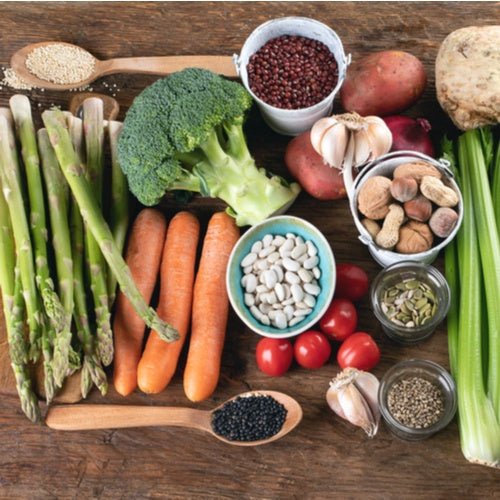Introduction
Candida albicans is one of the fungi that live within us. There’s nothing innately wrong with Candida – at least in its correct amount. Our good bacteria normally keeps candida in check and balance.
However, if our good bacterias are gone because of antibiotics then they naturally grow over, creating a whole host of issues. A Candida overgrowth causes digestive upset, extreme bloating and weakens our immune system.
Did you know Candida also contributes to weight gain?
You betcha! Candida contributes to weight gain through multiple pathways.
First, yeast overgrowths increase our appetite for sugary starches and simple carbs. These nutrient-dense foods are stored as fat if we are unable to burn enough calories to utilize them as energy.
Secondly, Candida releases endotoxins. Our body protects us from the inflammatory toxins by storing them in our fat cells. As the toxin levels rise, our fat cells absorb more and more water to dilute the concentration of toxins, and the fat cells themselves become bigger and bigger.
If you’re struggling with stubborn weight gain around your midsection, Candida may be an underlying contributor. No matter how well you eat or how carefully you diet, you’ll struggle to lose weight until the Candida has been reined in.
Let’s explore the symptoms of a Candida overgrowth and examine effective herbal remedies for restoring balance to our guts and maintaining a healthy weight by eliminating excess Candida.
How to Tell If You Have a Candida Infection
How can you tell if a Candida overgrowth is fueling your dysbiosis? Testing will give you a definitive answer and you need look no further than the Organic Acids Test from Great Plains Laboratory.
Candida infections can mimic the generalized digestive symptoms associated with IBS, like bloating, gas, constipation and diarrhea. Some other signs that Candida is the source of your imbalance include:
- Brain fog and changes in cognition
- Decreased energy level
- Eczema, dandruff, acne and skin rashes
- Hair falling out
- White coating on the tongue
- Loss of sex drive
- Weight gain, especially around the hips, thighs and waist
- General itchiness & itchy rectum
Candida-Starving Diet
The first step in addressing a Candida overgrowth is to adopt a diet that will not feed the yeast in your gut. According to Dr. John Dempster, if we wish to recover from a Candida infection we must at least temporarily eliminate the following foods from our diets:
-
Foods that contain yeast
Steer clear of bread, muffins, pastries (even gluten-free varieties may contain yeast!), vinegar, citrus fruits, bananas, beer and wine. Yeast is added to many foods. Check labels to identify unsuspected sources.
-
Sugar
Yeast love sugar. When we have a Candida overgrowth our appetite for sweet, sugary foods increases to satisfy the yeast. Reduce yeast populations just by eliminating their favorite food. You’ll want to skip all sugars and sweeteners and cut back on or temporarily eliminate fruit while you’re recovering. This also means taking a break from milk and dairy products, as well as simple carbohydrates and grains.

Foods to Include While Recovering From Candida
Focusing on all of the things we ought to avoid can make it hard to know what we should eat! Let’s take a look at some foods that we should be sure to include in our diets to help us eliminate a Candida infection.
Here are the recommendations of Dr. Will Cole for foods that help us get our yeast level in balance:
-
Non-starchy vegetables
Dr. Cole recommends kale, spinach, Swiss chard and bok choy for high nutrient profiles without the sugary starches that Candida thrive on.
-
Safer meats
If you eat meat, choose grass-fed beef, wild-caught fish and organic organ meat to be sure you’re getting enough of vitamins A, D and K2 which support immune function and fuel beneficial bacteria.
-
Gut-healthy fats
Eat lots of healthy fats to protect your gut from inflammation and make your GI tract less hospitable to pathogens. Coconut oil, olive oil and avocado oil are all great choices. Coconut oil is especially great for Candida because it contains caprylic acid, a potent antimicrobial.
-
Fermented foods
Cultured foods help us recolonize our guts with desirable species. Remember to introduce them slowly and gradually increase your consumption to avoid the discomfort of heavy yeast die off.
-
Healthier sweeteners
While you’re avoiding sugar and fruits, you can use raw green stevia and xylitol in small amounts to sweeten your food.
-
Tea
Black tea contains tannins that help to eliminate Candida. And ginger tea is a popular herbal infusion that soothes and heals the lining of the gut.
 Herbal Remedies for Candida
Herbal Remedies for Candida
If there’s any good news about being afflicted with a Candida overgrowth, it’s that there are many natural, safe, gentle and effective remedies – and they are also inexpensive!
-
Oil of Oregano
Dr. Mary Ellen Shannon’s go-to treatment for Candida is oregano oil taken 3 times daily for 3 weeks.
-
Colloidal Silver
Dr. Shannon also uses colloidal silver, a powerful antifungal that is highly effective for killing Candida.
-
Berberine
Berberine is a great choice for Candida because it not only eliminates yeast but also stabilizes our blood sugar which is important because often people experience strong cravings for sweets during the initial phase of Candida die off.
-
Caprylic Acid
A beneficial fatty acid with antibacterial, antiviral, antifungal and anti inflammatory properties, caprylic acid is especially effective for treating Candida overgrowth. Good sources include coconut oil, MCT oil and sustainable palm oil.
Probiotics for Healing Candida
Dr. Dempster stresses the importance of taking probiotics when combating Candida. Beneficial bacterial species will boost your immune response and restore balance to your GI tract. Keep these things in mind when shopping for your probiotic supplement to make sure you choose one that will give you optimal support against Candida:
- It’s important to choose a product that is formulated to deliver the bacterial species to your intestines. This is achieved with capsules that do not dissolve when exposed to stomach acids. Check the label to make sure the product you choose uses capsules that enhance delivery.
- Pay attention to the number of organisms in each dose. Dr. Dempster urges you to select formulas that contain hundreds of billions of CFUs (Colony Forming Units).
- Choose products that contain strains that are proven to be effective against Candida. Species that you want to include are Lactobacillus plantarum, Lactobacillus paracasei and Lactobacillus acidophilus.













What Do You Think? Comment Below: